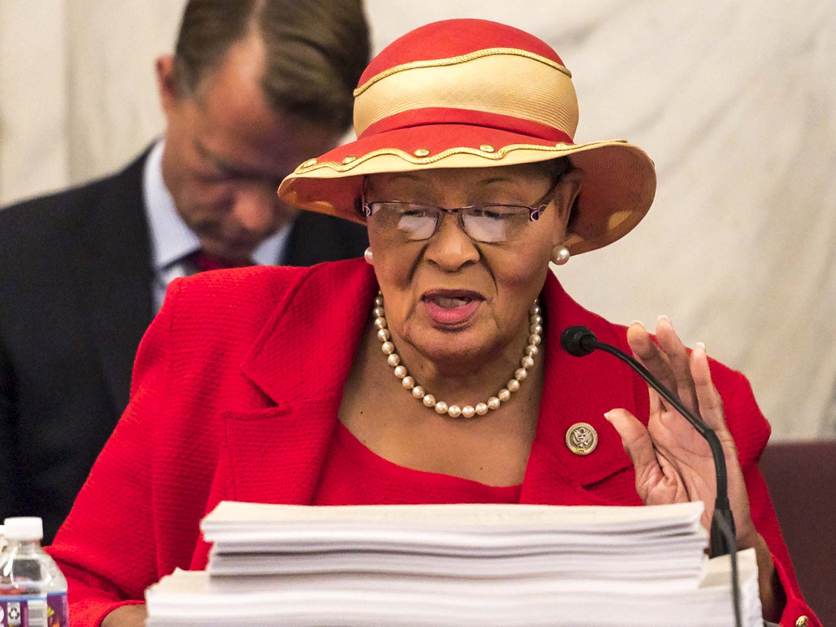Testing of workers at meatpacking plants may receive more attention in the next version of guidance meant to reduce the risk of COVID-19 infection at those facilities, the head of the National Institute of Occupational Safety and Health said Thursday.
Appearing before the House Education and Labor Committee’s workforce protections subcommittee, NIOSH Director John Howard said federal health and safety agencies are “beginning to think more seriously” about how to test all employees at meatpacking plants.
“That’s not really something that we put in the current edition of the guidance,” Howard noted. The current meatpacking guidance issued by the Centers for Disease Control and Prevention and the Occupational Safety and Health Administration says only that “facilities should consider the appropriate role for testing and workplace contact tracing (identifying person-to-person spread) of COVID-19-positive workers in a worksite risk assessment.”
“As we know, many meatpacking and processing plants are doing that kind of testing, so we’re beginning to think about that,” Howard told the lawmakers at the hearing, convened to examine workplace safety during the current pandemic.Howard’s remarks echo comments made by White House Coronavirus Response Coordinator Deborah Birx, who said last week, “What we’re asking [states] to do is proactively go and test everyone in meatpacking plants.”
Dozens of meat and poultry plants have shut down across the nation because of COVID-19 outbreaks, with many reopening after instituting safety measures recommended by the OSHA/CDC guidance, such as installing barriers between workers and enforcing social distancing where possible.
The closures and slowdowns at the packing plants because of COVID-19 outbreaks have forced pork producers have had significant financial impacts on livestock and poultry producers.
Some companies, often with a push from state and local health officials or unions who represent workers at their plants, have been testing workers. But Howard said “testing is only a snapshot in time” and can sometimes give workers “a false sense of security.”
He also said it is “very challenging” for federal officials to make recommendations that can be implemented in meat plants, where social distancing is often impossible.
Another problem, he said, is the plants are “very noisy,” causing workers and supervisors to sometimes remove their face shields and masks. “They’re shouting at each other mouth to ear,” he said. “That kind of interaction is a possible transmissive event — if we can prevent that from happening, that is a best practice that we think could really help.”
Subcommittee Chair Alma Adams, D-N.C., said in her opening statement that “more than 17,000 meat processing workers have been infected and an estimated 66 have died.”
Citing the Environmental Working Group, she said in Iowa, Nebraska and South Dakota, "coronavirus cases linked to meat workers represent 18, 20 and 29 percent of the states’ total cases, respectively.” North Carolina “leads the nation with the number of meatpacking plants facing an outbreak — with the state Department of Health and Human Services reporting that at least 23 plants have outbreaks with more than 1,300 worker infections," she said.
Adams and other subcommittee Democrats had harsh words for OSHA Principal Deputy Assistant Secretary Loren Sweatt, criticizing her agency for failing to punish employers for putting employees in danger.
Sweatt said OSHA has received nearly 5,000 COVID-19-related workplace safety complaints and issued one COVID-19 related citation. She argued that it makes more sense to either remove the worker from the hazard or remove the hazard from the workplace instead of pursuing enforcement action.
Interested in more coverage and insights? Receive a free month of Agri-Pulse or Agri-Pulse West by clicking here.
In the case of the more than 1,000 whistleblower complaints received, Sweatt said the agency has had some success in resolving complaints by getting fired workers reinstated and restoring their back pay.
Democrats at the hearing also pushed Sweatt to adopt an emergency temporary standard (ETS) to protect workers from the virus. She said she would not discuss the issue because of a recently filed AFL-CIO lawsuit seeking an ETS.
Republicans generally praised Sweatt and OSHA for issuing numerous guidance documents addressing a variety of industries and said an ETS was unnecessary. Howard said guidance is changing rapidly.
Ranking subcommittee member Bradley Byrne of Alabama said OSHA did not issue an ETS when the nation was dealing with other virus outbreaks such as H1NI and SARS. Rep. Andy Levin, D-Mich., responded that no one in the U.S. died of SARS, and there were only eight confirmed cases. CDC estimates that about 12,500 people died in the U.S. from H1N1.
Sweatt said OSHA is actively looking at meatpacking plants, mentioning “58 meatpacking compliance enforcement activities.”
"We have active enforcement efforts and we’ve been into these plants for inspections," she said.
For more news, go to www.Agri-Pulse.com


![Steve headshot 250x200[1]](http://www.agri-pulse.com/ext/resources/Headshots/Staff-Photos/thumb/Steve_Headshot_250x200[1].JPG?1738947158)
